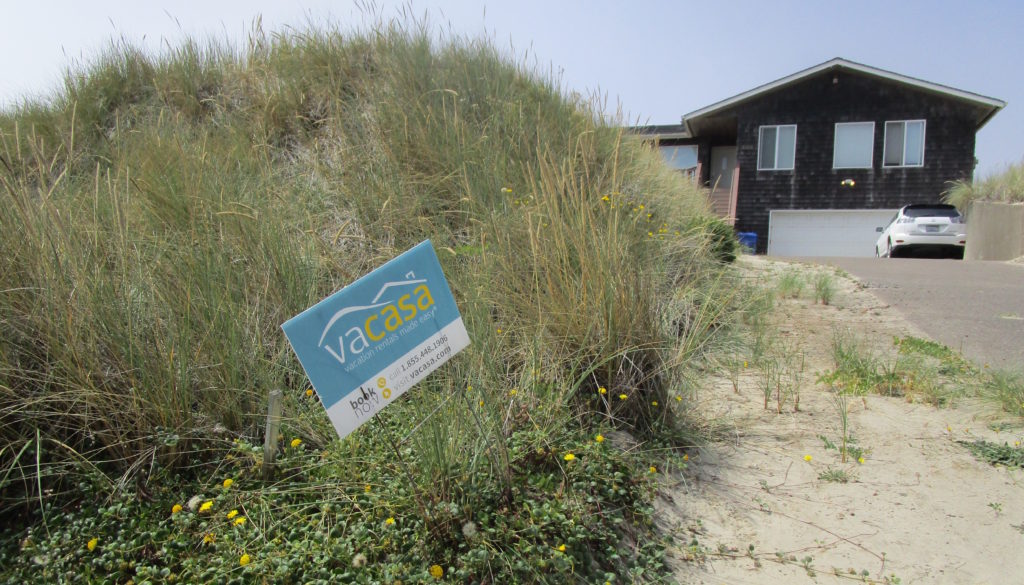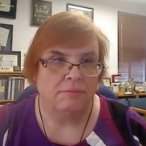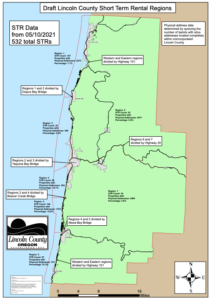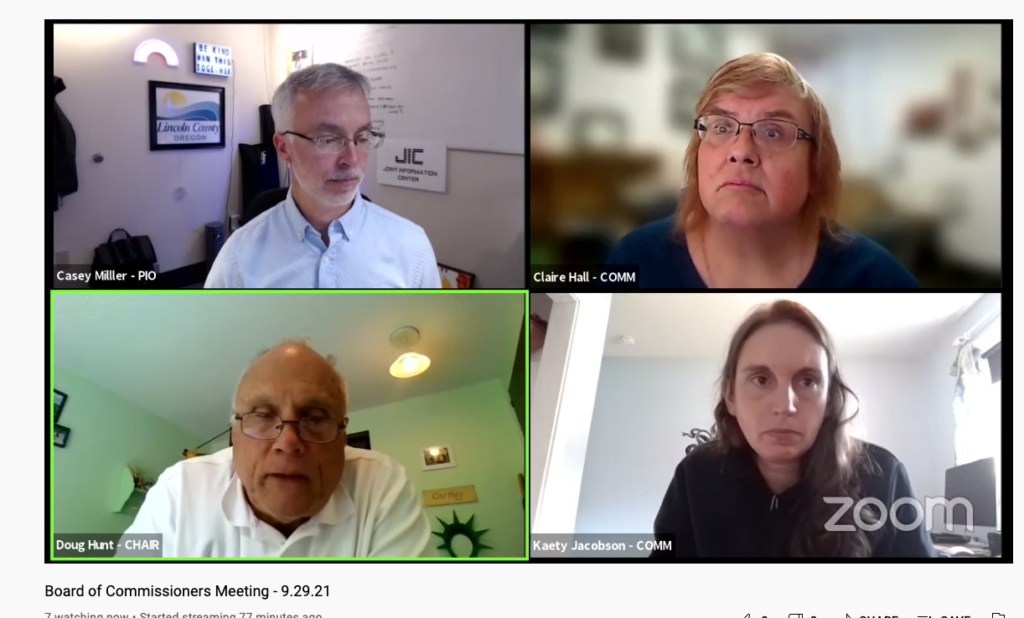
BY QUINTON SMITH/YachatsNews.com
After four months of no discussion, Lincoln County commissioners with little notice began moving ahead again Wednesday on tighter, new rules on vacation rentals in unincorporated areas of the county.
If they hold to a proposed schedule, the commission’s final decision would come just six days before ballots are counted in a hotly-contested countywide vote on whether to phase out vacation rentals in unincorporated residential neighborhoods.
Commissioners last discussed vacation rentals in late May, when for the fourth time in 18 months they extended a moratorium on new licenses to Nov. 30. They had been discussing and holding hearings on the issue since 2019.
Progress was also complicated by the July retirement of county counsel Wayne Belmont, who had been crafting the regulations and is now back working on contract to complete the vacation rental rules and other tasks.
Frustrated with the commission’s lack of movement, a group opposed to vacation rentals in residential neighborhoods filed signatures this summer for an initiative petition to phase them out over five years. Ballots will be mailed Oct. 13 and the election ends Nov. 2.
On Wednesday, Belmont returned with new proposals or tweaks on four areas of emphasis last discussed in May.
Although the commission’s agenda posted Friday said Belmont would give an update on vacation rentals, his memos, proposed ordinance changes and maps were only added to the commission’s packet 30 minutes before the start of Wednesday’s online meeting. Only six people were in the online audience.
The latest proposals would:
- Set license caps in seven areas of unincorporated county that would use attrition to lower the number of licenses west of U.S. Highway 101 and allow more licenses east of Highway 101;
- Decrease occupancy limits;
- Tighten septic inspections and standards, which could also be used to limit occupancy but phased in to allow certified companies time to complete inspections; and
- Set up an administrative hearings process to handle chronic offenders cited by the sheriff’s code enforcement deputy.
Commissioners had questions and suggested several tweaks Wednesday, but said they were OK with seeing revisions Oct. 13, taking public comments then, and voting on a revised ordinance Oct. 27.
Belmont and commissioners also used the end of their meeting to express concerns about the Nov. 2 initiative, including what Commissioner Doug Hunt felt would be “crippling financial effects” on Lincoln County should it pass. Oregon ballot measures passed in 2004 and 2007 allow property owners to file claims – not necessarily get paid — against a local government should they take action to lower the value of property.

Commissioner Claire Hall said the ballot measure, if approved, would likely face a legal challenge, similar to the ban on aerial spraying passed by voters in 2017 and overturned in court in 2019. She asked voters to “take a good look at the more surgical approach we’re taking here rather than the more radical approach” of the initiative.
Belmont said he thought the county’s regulating vacation rentals through the business license process instead of a land-use process was more effective and less susceptible to legal challenges.
Detailing the zones
The biggest difference between Wednesday’s proposals and those from May were more details on license limits in five “zones” west and two east of Highway 101.

There are currently 455 licenses in the five zones west of Highway 101, according to county data. Those would drop through attrition – the county does not allow the transfer of licenses when a property changes hands – to 360 under the differing new percentages.
Under the formula, the number of licenses east of Highway 101 would be allowed to increase from the current 77 to 138.
Belmont proposed lowering limits on licenses from the current range of 23 percent to 5.6 percent of all dwellings in the five “west” zones, to between 13 percent and 5 percent. Under questioning by Hunt, Belmont said staff arrived at those percentages by looking at the number and concentration of vacation rentals in neighborhoods.
The proposed zones, the number of vacation rentals now and under the lower, proposed percentages are:
- Zone 5: From the north city limits of Yachats to the city of Waldport — 87 rentals which are 23.3 percent of all addresses; drops to 49 rentals at 13 percent;
- Zone 4: From the Bayshore community north of Waldport to Beaver Creek north of Seal Rock — 146 rentals, 10.6 percent of all addresses; drops to 117 rentals at 8.5 percent;
- Zone 3: From Beaver Creek to the south edge of Newport — 40 rentals, 14.1 percent of all addresses; drops to 28 rentals at 10 percent;
- Zone 2: From the north edge of Newport to the south limits of Depoe Bay — 25 rentals, 5.6 percent of all addresses; drops to 22 rentals at 5 percent;
- Zone 1: From Depoe Bay to Lincoln City — 157 rentals, 7.1 percent of all addresses; drops to 144 rentals at 6.5 percent;
- Zone 6: All the unincorporated county east of U.S. 101 from Lincoln City in the north to Highway 20 in the south — with 43 rentals, 0.9 percent of all addresses; increases to 70 at 1.5 percent;
- Zone 7: All of unincorporated county east of U.S. 101 from Highway 20 in the north to the Lane County line in the south — 34 rentals at 0.8 percent of all addresses; increases to 67 at 1.5 percent.
Hunt said he thought the number of rentals in the west zones were still “a little high,” adding it would take years to see the impact of the limits under a moratorium on new licenses or transfers.
“The attrition won’t happen overnight,” Belmont replied. “But there will be no new short-term rentals.”
Lower guest limits
Other changes that have been previously discussed included a maximum occupancy of two people per bedroom plus two additional people – a change from a straight limit of two people per bedroom first suggested in March. Lincoln County currently has one of the most liberal occupancy limits in Oregon – three people per bedroom plus an additional two people.
The latest proposal would also prohibit a rental from being used for events, such as weddings and other large gatherings.
But Commissioner Kaety Jacobson wondered if an “event” was too difficult to define and for the sheriff’s department to enforce, suggesting “just a straight number” per rental.
Hunt agreed that a specific, maximum number of guests should apply to all properties, adding that eight “grandfathered” rentals should also have their larger occupancy limits lowered in line with everyone else’s.
“I would like to see this tightened up,” he said, later adding that he preferred a number “significantly below” the maximum of 16 allowed by building code. Hall and Jacobson agreed.

Sudden discussion disappoints
Organizations on both sides of the ballot measure were also surprised at the commission’s sudden work Wednesday on the issue.
“This felt reactive,” said Jamie Michel of Waldport, a vacation rental manager and co-founder of Via Oregon, which is opposing the Nov. 2 measure. “My guess is that they’re afraid if this thing passes they’re in a world of hurt.”
Michel and other vacation rental managers have been critical of the county’s process, which has involved several hearings where people go over the same points and arguments and the unwillingness of commissioners to bring representatives of the various interests together to see what kind of regulations could be worked out.
The group that put the measure on the ballot, 15neighborhoods, was also surprised “to have so much presented today and proposed for a vote in October, with no advance notice,” it said in an emailed statement to YachatsNews, but said it needed time to analyze Belmont’s proposals and the commissioners’ comments.
“They seem to be proceeding as if the ballot measure does not exist,” the group said. “Because their licensing freeze expires Nov. 30, presumably they want to have something enacted whether the measure passes or not.”
But in its statement, the group said they were “disappointed” by commissioners’ comments on the ballot measure “and we don’t agree.”
In response to a question from YachatsNews, Hunt said the commission’s work Wednesday was far from being done.
“There are four weeks between now and when the board could potentially take action on the ordinance,” he said. “There’s still a month for people to comment as we move forward … and we’re moving forward on the parameters that have been discussed publicly and will continue to be discussed publicly.”


